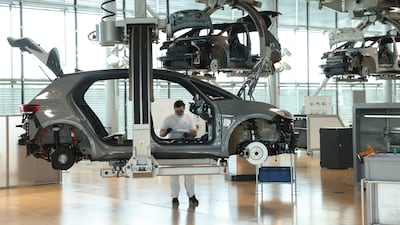German Chancellor Olaf Scholz broke ground on Monday on a planned battery factory intended to help the country's powerful car industry make the switch to electric vehicles.
The gigafactory being built by the Swedish company Northvolt is expected to produce batteries for a million electric cars a year in Heide, in the far north of Germany.
Almost $1 billion of German subsidies were put up to keep Northvolt from defecting to the US, as countries compete for a slice of the clean tech industry.
Germany is home to some of the world's top car manufacturers, such as Audi, Mercedes and Volkswagen, but deadlines are looming for the industry to go green.
"Germany was, is and will remain a strong industrial country, and making good cars will remain a backbone of our industry even beyond the combustion engine," said Mr Scholz.
"For that, we need batteries made in Germany, made in Europe. Therefore it is good news for our whole country ... that batteries for a million cars will be produced in a climate-friendly way here in the north."

Northvolt says the switch to electric has slowed due to "clouds in the sky" such as high energy prices but that the "mega-trend" away from petrol is still there.
"The fact that we are going to go from combustion to electric is without a doubt going to happen," said its chief executive Peter Carlsson.
The company says it will draw on clean power from the windy German north to produce the "world's greenest batteries".
The 110-hectare factory, intended to start production in 2026, will also be connected to Denmark and Norway's power grids.
Subsidy battle
Northvolt had signalled it could move the factory to the US to benefit from President Joe Biden's vast green subsidy package if it did not receive state backing in Europe.
As a result, the EU approved €902 million ($977.6 million) of German state aid to allow Northvolt to set up shop in Germany.
It was the first such approval under new EU rules on investment "at risk of being diverted from Europe due to the availability of foreign subsidies".

Germany's goal is to have 15 million electric vehicles on its roads by 2030. There were just 1.4 million at the start of this year.
It also has a 2045 net zero deadline in order to curb the impact of Europe's largest economy on carbon emissions and the climate.
Parts of Mr Scholz's coalition have pressed for targets on clean motoring to be loosened in order to embrace synthetic e-fuels.
E-fuels are not yet made in large quantities and some doubt if they will ever be commercially viable. However, Germany has won assurances from the EU that they will remain in the picture.
The EU intends to make zero-emission cars the norm by 2035 but a decision on exactly what is covered has been kicked down the road.
Britain last year delayed a ban on new petrol cars from 2030 to 2035. The US has not set a hard deadline.


